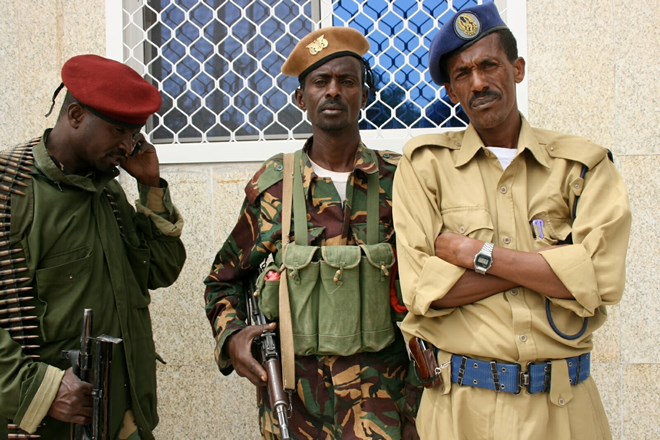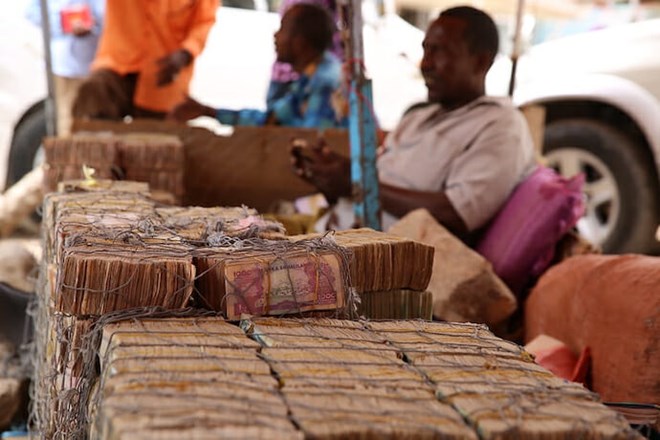
Thursday April 8, 2021
By Cok Corrado

Guards remain vigilant at the 2010 Somaliland presidential inauguration./Teresa Krug
A new actor is jostling in the Horn of Africa. Somaliland, a self-declared breakaway republic of northern Somalia, scaled up its foreign policy in 2020 following years of lobbying for international recognition. Emboldened by its geopolitical centrality, leaders of Somaliland embraced a new quest for regional and international allies last year. Nevertheless, President Muse Bihi Abdi’s new strategy is set to build new ties while also breaking others. The ultimate result of this brinkmanship diplomacy remains to be seen.
The Republic of Somaliland separated from Somalia in 1991. Its ten-year conflict against Mogadishu had reached appalling levels of violence, such as the bombing of Hargeisa in May 1988. Therefore, when Somalia plunged into anarchy, Somaliland leaders carved out their enclave in northern Somalia and continued to enforce their autonomous rule in open defiance to Mogadishu. The latest round of talks between Mogadishu and Hargeisa took place last summer in Djibouti, but it quickly went awry. Somaliland’s foreign policy indirectly contributed to that outcome. Now, the Somali constitutional crisis further rules out an agreement between the two parties.
Somaliland is a net beneficiary from power competition in the Red Sea and the Gulf of Aden. As regional powers grew interested in this strategic waterway, ports became economic and security pivots. In parallel to its effort in Yemen, the United Arab Emirates (UAE) crossed the Gulf of Aden and landed in the historic port city of Berbera. Despite the ban from the Somali federal government, the Dubai-controlled DP World signed a 30-year concession with Somaliland authorities to develop and manage the port. In March 2021, Abu Dhabi appointed a career diplomat to its trade office in Hargeisa, which signaled its desire to maintain strong ties with the local authorities.
In March, DP World delivered three gantry cranes to Berbera as part of its programme to bring the port’s capacity to 500,000 TEU (Twenty-Foot Equivalent Unit), hence overtaking Djibouti’s container terminal with its 350,000-TEU capacity. So far, Djibouti maintains the upper hand due to its superior infrastructures serving the port—specifically, the Djibouti-Addis Ababa railway, its developed free trade zone, and the Chinese-built Doraleh Multipurpose Port, which opened in 2017. However, the Berbera port will enhance its competitiveness after completing the free trade zone by the Emirati company and the carriageway connecting Berbera to the Ethiopian border in 2022.
Landlocked Ethiopia is pivotal for Djibouti and Somaliland. Addis Ababa depends on the tiny outlet of Djibouti for 90 percent of its maritime imports. Therefore, it decided to diversify its commercial routes by investing in the port of Berbera. Since 2016, the Ethiopian government has owned 19 percent of the port’s share. Yet recent decisions have put Addis Ababa and Hargeisa at loggerheads. As part of his project to establish a regional order, Prime Minister Abiy Ahmed built ties with Somalia’s central government in Mogadishu. However, this unprecedented strategy-change was perceived with hostility in Somaliland, which reacted by leveraging Ethiopia’s main fault line: the Nile dam dispute.

Money market in Hargeisa, Somaliland. (Fiona Graham/WorldRemit)
After the Ethiopian government scaled down diplomatic relations with Hargeisa in favor of Mogadishu, the president of Somaliland hosted an Egyptian delegation to discuss trade and investments in July 2020. The parties reportedly discussed the leasing of an Egyptian military base as well. The visit alarmed Addis Ababa. An Egyptian presence in a neighboring country would represent a strategic threat to Ethiopia. That was sufficient to convince Abiy Ahmed to send a delegation to re-establish full diplomatic relations that month. In September, another delegation of top security officials landed in Hargeisa to discuss further cooperation and, possibly, the creation of an Ethiopian naval base in place of the Egyptian. Addis Ababa has probably averted the threat of an Egyptian base on its doorstep for the time being. However, it will be increasingly difficult to balance the alliance with Mogadishu and Somaliland’s new posture.
Exploiting Disputes
Besides the Nile dam dispute, Somaliland’s authorities have shown shrewdness in exploiting regional and international divisions to advance their position abroad. Another case is the recent dispute between Kenya and Somalia. The diplomatic spat mainly revolves around the maritime border, relevant for the adjudication of oil and gas offshore fields, and Kenya’s support to the Somali border state of Jubaland, currently hostile to Mogadishu.
In mid-December, President Bihi visited Kenya and was received by President Uhuru Kenyatta as a normal head of state. During the bilateral meeting, the two presidents agreed to open a consulate in Hargeisa, set up direct flights, and launch cooperation initiatives in agriculture, livestock, energy, as well as between the ports of Mombasa and Berbera. In response, the Mogadishu government severed diplomatic ties with Nairobi, signaling its readiness to do the same with any other country which builds relations with Somaliland.
But the most surprising step taken this summer by President Bihi was recognizing Taiwan. On July 1, Taiwan’s foreign affairs minister made public the deal between Somaliland and Taiwan. Under the arrangement, both administrations agreed to open representative offices and foster cooperation across various sectors. China swiftly reacted by sending its ambassador to Somalia, Qin Jian, to Hargeisa. According to reports, the Chinese delegations made a series of concessions, including substantial infrastructure investment packages and the opening of a representative office. Nonetheless, President Muse Bihi Abdi declined the offer, receiving China’s harsh criticism and veiled threats.
Somaliland is the first African entity to so openly defy Beijing and the “One-China policy.” As an unrecognized entity, Somaliland cannot issue debt bonds on international markets. Therefore, it does not depend on China for debt financing like other African states, especially neighboring Djibouti and Ethiopia. China’s intensive fishing off Somaliland’s coast (authorized by Mogadishu only) was a relevant reason for attrition, but other factors entered the calculus. Djibouti is becoming the pivot of China’s penetration in the Horn of Africa and this might lead the U.S. to move out of Djibouti someday while keeping a military base close to Bab el-Mandab. The deal with Taiwan received an important endorsement from Washington. And against this background, Somaliland is showing its suitability as a geopolitical partner for the United States.
Another cleavage has recently (re)emerged: Somalia’s constitutional crisis. The impasse turned into a crisis on February 8, when the mandate of the Somali parliament and President Mohamed Abdullahi Farmaajo, largely known as “Farmaajo,” expired without an agreement on the next elections between the Federal Government and Somali Member States. Among the issues on the table, there is the designation of delegates for Somaliland, who should vote for parliament and president in the elections and could prove decisive in the re-election (or the defeat) of President Farmaajo. Hargeisa has no say in the appointment of these delegates and is not directly involved in the confrontation. Yet, the isolation and distraction of Mogadishu’s government play into the hands of Somaliland that is expanding its diplomatic outreach across Africa, and has recently welcomed delegations from Malawi and Zambia to discuss bilateral cooperation.
Somaliland’s brinkmanship strategy risks further destabilizing an already turbulent region. Like other states in the Horn of Africa, Hargeisa exploited the divide between the UAE-Saudi Arabia and Qatar-Turkey axes, obtaining a fruitful partnership with the former. Yet President Bihi also openly distanced Somaliland from China and anchored it in the American sphere. This decision is unprecedented in the Horn of Africa since all other countries have, to some extent, opened their doors to China given Washington’s gradual retreat from the region.
This strategy is fraught with dangers. First, China is present economically and militarily in the Gulf of Aden, as well as in all Somaliland’s neighbors, whereas the U.S. is not expected to double down its engagement in the region. This leaves plenty of room for retaliation to Beijing. Furthermore, Hargeisa complicates its relations with its allies since both the UAE and Ethiopia enjoy strong partnerships with China. Ethiopia, in particular, will have to compete for influence in Somaliland with its most bitter enemy, Egypt, while maintaining strong ties with Djibouti and Somalia at the same time. In addition to the China-Somaliland rift, the UAE will have to manage the growing tensions between Somaliland and the Somali state of Puntland, another Emirati ally in Somalia. Puntland and Somaliland have long clashed over the areas of Sanaag and Sool and a recent uptick of violence shows that the situation continues to deteriorate unabated.
In brief, Somaliland’s new diplomacy risks deepening polarisation around the U.S.-China competition and intensifying hostilities between regional actors in the Horn of Africa.